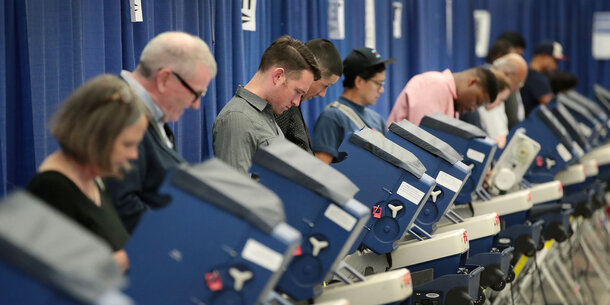This week in Georgia, legislators are considering a provision in House Bill 531 that would throw out a voter’s entire ballot if it is cast at the wrong precinct — including votes for the contests that the voter is actually eligible to participate in.
Although local races on the ballot can vary from precinct to precinct, such as for a city council member, many races look identical across a county. Many of Georgia’s counties, for instance, are entirely contained in a single U.S. congressional district. This means that the same two candidates are on the ballot in every precinct in the county. In other words, even if a voter moved to a new precinct, the congressional race they would be eligible to vote in might still be the same. This is obviously true of higher-level races, too. A valid Georgia voter should still be able to vote for governor or president, even if they voted at the wrong precinct.
While this proposed policy change will be harmful to all sorts of voters who cast a ballot at the wrong polling place on Election Day, it will fall especially on voters who have moved within their county. While we do not know exactly who is moving within the county, we do know where they live—in neighborhoods that are more of color and have lower incomes. That is about as direct a line as there is.
We came to this conclusion by looking at the racial and economic demographics of the Georgia census tracts with the most and fewest in-county movers using data from the 5-year American Community Survey ending in 2019. We compared census tracts in the top 25th percentile in terms of in-county movers to tracts in the bottom 25th percentile. There were clear differences as the figures below show.
In the first figure, we show the racial differences between the two groups. Although the average census tract with the most in-county movers was 47 percent Black, the average census tract with the fewest movers was just 22 percent Black. On the other hand, tracts with many movers were far less white than tracts with few movers (37 percent versus 64 percent). Because Black voters live in neighborhoods with much higher rates of in-county moves, they are likely to be hit especially hard by the elimination of the out-of-precinct voting allowance.
This divide also shows up in the economic circumstances of these two groups of census tracts. Tracts with few in-county movers had substantially higher incomes and lower unemployment rates than the tracts where many individuals had moved within the county. A policy making it harder for voters to participate after moving will thus disproportionately fall on voters in more economically marginalized neighborhoods.
If Georgia moves to nullify every out-of-precinct ballot, it will disproportionately fall on voters and neighborhoods with many movers — neighborhoods who are also home to many racial minorities and lower-income voters.
As we wrote earlier this month, anti-voter legislation impacting absentee voting in the Peach State will disproportionately harm Black voters. This latest move represents a doubling-down on the disenfranchisement of Black Georgians. While each of these policies — from limiting absentee voting hours and Sunday voting to eliminating out-of-precinct and mail voting — might disenfranchise discrete sets of voters on their own, the cumulative effect of so many targeted bills will reduce access to the ballot box for Black voters across the state.



